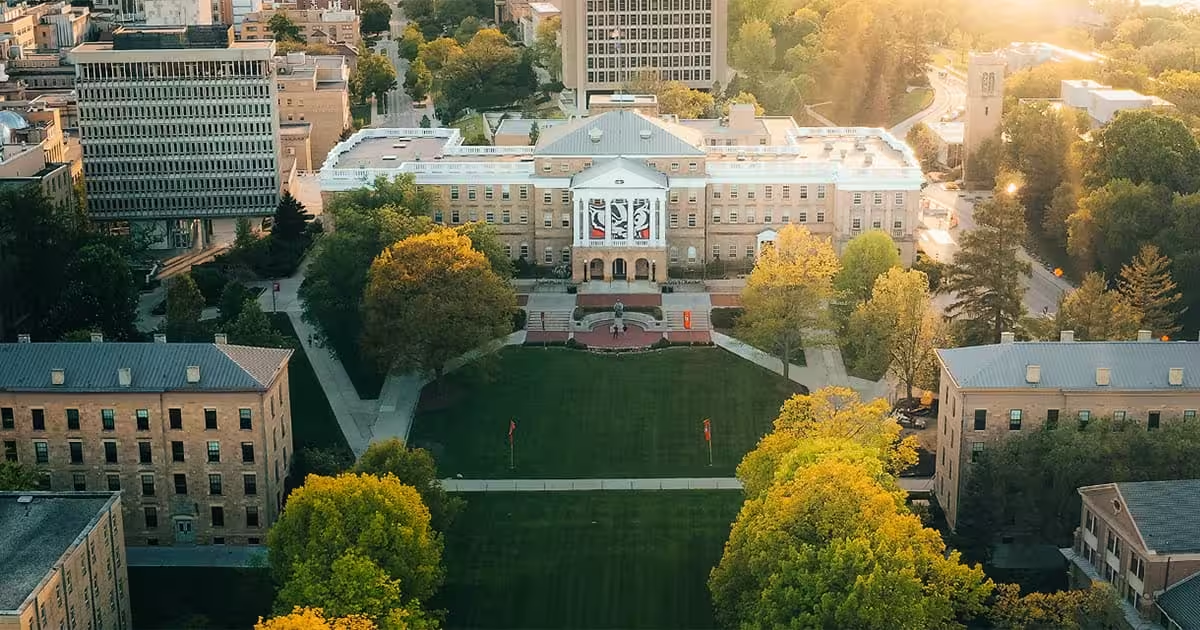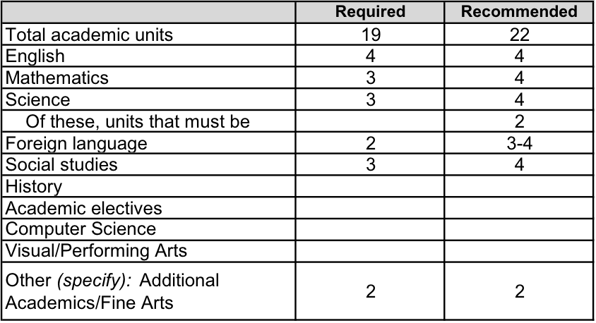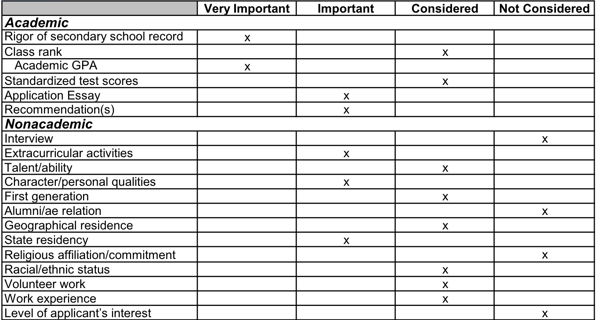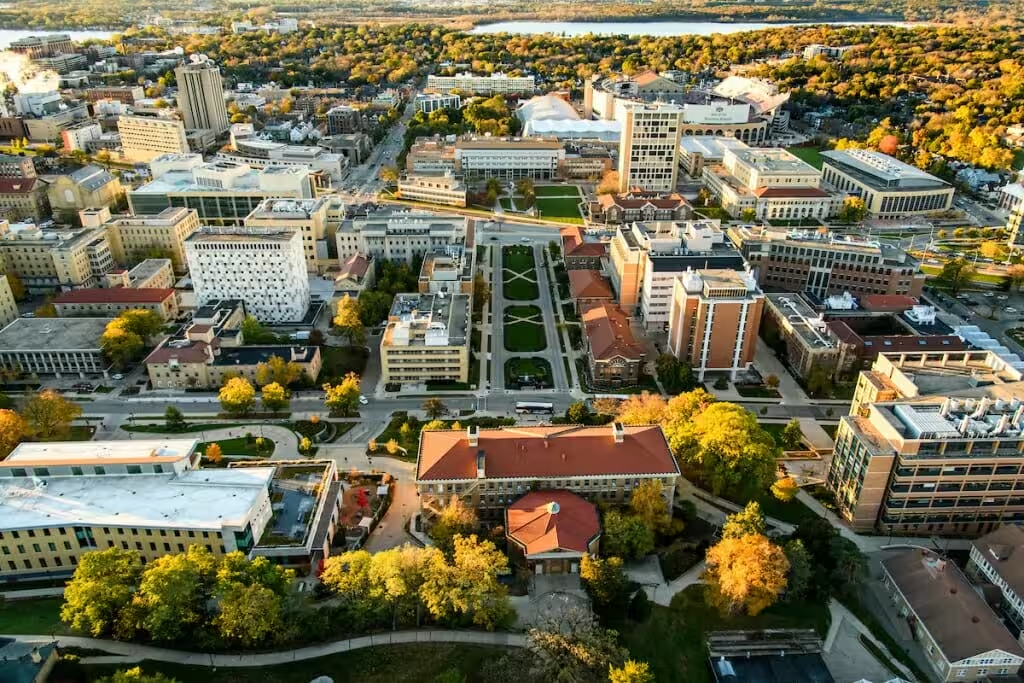University of Wisconsin-Madison Admissions Profile

Introduction
Welcome to our comprehensive guide on the University of Wisconsin-Madison admissions profile. If you're considering applying to UW-Madison, this article will provide you with all the essential information you need to know. From admission requirements to the application process, scholarships, and campus life, we've got you covered. Let's dive in and explore what makes UW-Madison such a remarkable institution.
UW-Madison Admissions Profile
The University of Wisconsin-Madison, often referred to as UW-Madison or simply Madison, is a prestigious public research university located in Madison, Wisconsin. Founded in 1848, UW-Madison is known for its world-class faculty, cutting-edge research, and vibrant campus community. With a wide range of academic programs and a commitment to excellence, UW-Madison offers an exceptional educational experience.
Below are tables highlighting how UW-Madison evaluates each applicant through information published in the Common Data Set, a resource that compiles a standardized list of data items provided by universities about their admissions profiles.
Distribution of high school units required and/or recommended

Relative importance of each of the following academic and nonacademic factors in your first-time,
first-year, degree-seeking general (not including programs with specific criteria) admissions
decisions

SAT and ACT Policies


Admissions Requirements
To gain admission to UW-Madison, applicants must meet certain requirements. Here are the key factors considered during the admissions process:
-
Academic Achievement: UW-Madison seeks students who have demonstrated academic excellence. Admissions officers review your high school coursework, grades, and class rank. They look for students who have challenged themselves academically and have excelled in their studies.
-
Standardized Test Scores: While UW-Madison takes a holistic approach to admissions, SAT or ACT scores play a role in the evaluation process. It's recommended that applicants aim for scores within or above the middle 50% range of admitted students. However, it's important to note that UW-Madison has implemented a test-optional policy for the 2022-2023 and 2023-2024 admissions cycles.
-
Essays and Personal Statements: UW-Madison requires applicants to submit essays and personal statements that provide insights into their character, experiences, and aspirations. These essays offer an opportunity to showcase your unique qualities, demonstrate your writing skills, and highlight your fit with UW-Madison.
-
Letters of Recommendation: UW-Madison typically requires one letter of recommendation from a teacher or counselor who can speak to your academic abilities, character, and potential for success at the university. Choose a recommender who knows you well and can provide specific examples of your achievements and qualities.
The Application Process
Applying to UW-Madison involves several steps, and it's important to stay organized throughout the process. Let's walk through each stage of the application process:
1. UW System Application or Common Application
UW-Madison accepts both the UW System Application and the Common Application. Choose the application platform that you are most comfortable with and complete the application form accurately, including personal information, academic history, and extracurricular involvement.
2. Supplemental Questions
As part of its holistic admissions process, the University of Wisconsin-Madison (UW-Madison) employs the use of supplemental essays. These essays serve as an essential tool in assessing an applicant's individuality, understanding their perspective, and gauging their fit within the UW-Madison community.
In the application process for UW-Madison, applicants must respond to one required essay question. This essay requirement is standard across all programs. However, depending on the chosen major, additional program-specific essays may be required. Each essay should provide a well-rounded and unique picture of the applicant, helping the admissions committee understand them beyond their academic credentials.
The principal essay prompt asks students to explain why they are interested in the major they have selected. The prompt specifically instructs applicants to discuss their personal and academic reasons for their choice and to elaborate on how the University of Wisconsin-Madison will help them achieve their academic, career, or life goals. This essay demonstrates an applicant's dedication to their intended field of study and gives the committee a sense of their future aspirations.
In responding to this prompt, applicants should show clear knowledge of UW-Madison's programs, resources, and opportunities related to their chosen major. It's also beneficial to discuss relevant past experiences, whether in academics, extracurricular activities, or work experiences, that have prepared them for their chosen field. By doing so, applicants can highlight their enthusiasm and preparedness for their academic path at UW-Madison.
For those applying to specialized programs, additional supplemental essays may be required. These prompts tend to focus on the applicant's interest and experiences relevant to the specific program. Each essay provides an additional chance for applicants to showcase their passion, commitment, and suitability for their desired course of study.
The supplemental essays for UW-Madison should be thoroughly thought out and carefully crafted. These essays are the applicant's chance to demonstrate their personality, academic drive, and alignment with the university's ethos. Above all, applicants should remember to stay authentic and genuine in their responses, as the most impactful essays often provide insight into the individual's unique experiences, values, and goals.
Sample Essays
This prompt is only for students applying through the UW System Application.
Prompt: This part is all about you. Tell us about something you’ve done — academically or personally — and what you’ve learned from it (approx. 1 page). Was it a success or a challenge? Did it represent a turning point in your life? How did this particular moment in your life influence you, and how will it continue to influence you as you pursue your college education?
Example:
Day 1: “Labbayka Allāhumma Labbayk. Labbayk Lā Sharīka Laka Labbayk,” we chant, sweat dripping onto the wispy sand in brutal Arabian heat, as millions of us prepare to march from the rocky desert hills of Mount Arafat to the cool, flat valleys of Muzdalifa. As we make our way into the Haram, my heart shakes. Tears rolling down my cheeks, we circumvent the Ka’ba one last time before embarking on Hajj, the compulsory pilgrimage of Islam. It became the spiritual, visceral, and linguistic journey of a lifetime.
Day 3:
“Ureed an Aśhtareę Hijab.”
“Al-harir aw al-Qathan?”
“Ķhilaahuma.”
“Kham ťhamanu-huma?”
“Mi’at Riyal.”
“La. Khizth sab’een.”
“Sa’uethikhá Sab’een.”
“Shukran laķ.”
“Show me hijabs.”
“Silk or cotton?”
“Both.”
“How much do these cost?”
“100 Riyal.”
“No. Take 70.”
“Fine. Thanks Hajjah.”
In Makkah, I quickly learn shopkeepers rip off foreigners, so exchanges like this, where I only have to say a few Arabic words, make me appear local. It also connects me with real locals: the Saudi Arabian pharmacist who sells me cough syrup, the Egyptian grandmother seeking directions to the restroom, the Moroccan family who educates me on the Algerian conflict. As the sounds of Arabic swirl around me like the fluttering sands (Jamal, Naqah, Ibl, Ba’eer…), I’m reconnecting with an old friend: we’d first met when I decided to add a third language to English and Bengali.
Day 6: The tents of Mina. Temperature blazing. Humidity high. I sleep next to an old woman who just embarked on her twentieth Hajj. When I discover she’s Pakistani, I speak to her in Urdu. Her ninety-year old energy--grounded, spiritual, and non-materialistic--inspires me. So far, every day has been a new discovery of my courage, spirit, and faith, and I see myself going on this journey many more times in my life. My new friend is curious where I, a Bengali, learned Urdu. I explain that as a Muslim living in America’s divided political climate, I wanted to understand my religion better by reading an ancient account of the life of Prophet Muhammad, but Seerat-un-Nabi is only in Urdu, so I learned to read it. I was delighted to discover the resonances: Qi-yaa-mah in Arabic becomes Qi-ya-mat in Urdu, Dh-a-lim becomes Zaa-lim… Urdu, which I had previously only understood academically, was the key to developing a personal connection with a generation different from mine.
Day 8: “Fix your hair. You look silly,” my mom says in Bengali. When my parents want to speak privately, they speak our native tongue. Phrases like, “Can you grab some guava juice?” draw us closer together. My parents taught me to look out for myself from a young age, so Hajj is one of the only times we experienced something formative together. Our “secret” language made me see Bengali, which I’ve spoken all my life, as beautiful. It also made me aware of how important shared traditions are.
As I think back to those sweltering, eclectic days, the stories and spiritual connections linger. No matter what languages we spoke, we are all Muslims in a Muslim country, the first time I’d ever experienced that. I came out of my American bubble and discovered I was someone to be looked up to. Having studied Islam my whole life, I knew the ins and outs of Hajj. This, along with my love for language, made me, the youngest, the sage of our group. Whether at the Al-Baik store in our camp or the Jamarat where Satan is stoned, people asked me about standards for wearing hijab or to read the Quran out loud. I left the journey feeling fearless. Throughout my life, I’ll continue to seek opportunities where I’m respected, proud to be Muslim, and strong enough to stand up for others. The next time I go to Hajj, I want to speak two more languages: donc je peux parler à plus de gens and quiero escuchar más historias.
Prompt: Tell us why you decided to apply to the University of Wisconsin-Madison. In addition, please include why you are interested in studying the major(s) you have selected. If you selected undecided, please describe your areas of possible academic interest.
Example:
When I was young, I drew planes almost everyday. Planes with three, four, or even eight turbines. Planes with multiple wings and two fuselages. My planes were impossible according to the laws of physics, but I tried to create them anyways.
In middle school, I became fascinated with building planes. After watching hundreds of hours of FliteTest on YouTube and building their kits, I was ready to create my own. My first idea started with a single wing. I drew up a 3’ 4” long wing on a sheet of foam board and, after drawing three more prototypes, I assembled it. Then, I wired the two servos and a single 2280kv Radial 2218 brushless motor. On its maiden flight, I threw it into the air and it went straight into the ground. Too much weight in the front, Kanishka. Back to the garage.
In high school, I became captivated with cars, more specifically hydrogen and electric cars. I created a Hydrogen Car team to compete in a hydrogen fuel cell endurance race. I learned how to make a fuel cell more efficient. Ambitious, I worked tirelessly to get to the world finals. I devised a way to use the motor’s thermal energy and convert it into electrical energy, making our car more efficient.
I am a creator. The laws of physics often hinder my creativity, but I keep trying to push the limits of what is possible.
In college, I hope to combine my research in hydrogen fuel cells and airplanes to design a new type of plane that isn’t electric or combustion based. At UW, I want to major in mechanical engineering to accomplish just that.
For me, learning through building is essential. I enjoy applying angular momentum equations from AP Physics C into my coding projects to make a virtual car move. At UW, I am particularly interested in the project-based format of some classes. I’m eager to take Energy Systems Laboratory as it is a unique class to UW that explores different energy conversion systems in a lab-based format. By learning about the different systems, I can explore how they can be combined to achieve maximum efficiency.
Outside the classroom, I want to conduct research on energy systems in the transportation sector. UW’s Energy Institute is perfect for that. I’m intrigued by Professor Xin Wang’s research on ‘Energy Sponges.’ I think that his idea could be used in a lot of transportation sectors and could change the way we use energy. I want to assist him in his research. Further, I want to conduct research on thermoelectric plates and the possibility of making them flexible to accommodate a greater variety of uses.
Throughout high school, racing has been my favorite extracurricular. The drive to create a car that is 12% more efficient while also being 10% faster keeps me thinking of different ways to cut weight or innovate upon the fuel cell. In college, I want to continue racing. As lead engineer of the UW Formula Electric SAE Team, I want to utilize thermoelectric plates and new battery technology to make a faster, more efficient car.
While my future is still unknown, UW will provide me the skills needed to create new technology. Further, I’ll contribute in racing and engineering through meaningful activities and research.
3. Letters of Recommendation
UW-Madison typically requires one letter of recommendation from a teacher or counselor. Select someone who knows you well and can speak to your academic abilities, character, and potential for success at the university. Follow the instructions provided on the application for submitting letters of recommendation.
4. Application Fee or Fee Waiver
There is an application fee to submit your application to UW-Madison. However, fee waivers are available for eligible students who demonstrate financial need. Review the fee waiver information on the UW-Madison admissions website for specific details and instructions.
5. Deadlines
When it comes to applying to the University of Wisconsin-Madison (UW-Madison), adhering to the application deadlines is of paramount importance. These dates are strictly enforced, and late applications can significantly compromise a student's chances of gaining admission.
UW-Madison offers two application options for first-year students: Early Action and Regular Decision. Here's a closer look at the specific deadlines:
-
Early Action (EA): Students who are particularly keen on UW-Madison and want an earlier decision can opt for the Early Action plan. Under this non-binding option, the application deadline is November 1. Applicants can expect to receive their admissions decisions by the end of January.
-
Regular Decision (RD): The majority of students apply under the Regular Decision plan. The application deadline for Regular Decision is February 1, with decisions generally released by the end of March. Accepted students are then required to make their final enrollment decision by May 1, the national decision deadline.
Transfer students need to be aware of different deadlines. For Fall semester admission, the transfer application deadline is typically in March, while for Spring semester admission, it usually falls in October of the previous year.
International students should adhere to the same deadlines as domestic students for the Early Action and Regular Decision options. However, they may need to account for additional time to arrange visa-related documents should they be admitted.
It's important to note that financial aid applications and housing applications also have their own separate deadlines. For the most accurate information, students should always refer to the official UW-Madison admissions website and the Office of Student Financial Aid.
In conclusion, meeting all application deadlines is a crucial step in the University of Wisconsin-Madison admissions process. Not only does it demonstrate your organizational skills and commitment to your future, but it also ensures your application gets the thorough review it deserves.
Scholarships and Financial Aid
UW-Madison is committed to making education affordable and offers various scholarships and financial aid options to assist students. Here are a few examples:
-
Merit-Based Scholarships: UW-Madison offers a range of merit-based scholarships to incoming students. These scholarships are awarded based on academic achievements, leadership qualities, or other outstanding accomplishments. The Office of Student Financial Aid can provide more information on available scholarships.
-
Need-Based Financial Aid: UW-Madison provides need-based financial aid to eligible students. By submitting the Free Application for Federal Student Aid (FAFSA) and the CSS Profile, students can be considered for grants, loans, work-study programs, and other forms of financial assistance.
-
Residency-Based Scholarships: UW-Madison offers scholarships specifically for Wisconsin residents. These scholarships recognize academic achievements and provide financial support to in-state students pursuing their education at UW-Madison.
Campus Life and Resources
UW-Madison offers a vibrant campus life with a wide range of resources and opportunities for students to engage in. Here are some highlights:
-
Academic Excellence: UW-Madison is known for its academic rigor and breadth of programs. With over 130 majors and certificates across various disciplines, students have the flexibility to explore their interests and pursue their academic passions.
-
Research Opportunities: UW-Madison is a leading research institution, providing numerous research opportunities for undergraduate students. Students have the chance to work alongside faculty members on cutting-edge projects, contribute to new discoveries, and develop valuable research skills.
-
Student Organizations and Activities: UW-Madison boasts a vibrant and diverse student community. With over 900 student organizations, there are ample opportunities to get involved in extracurricular activities, clubs, and campus events that align with your interests and passions.
-
Campus Facilities: UW-Madison offers state-of-the-art facilities, including libraries, research centers, laboratories, and recreational facilities. These resources support academic pursuits, provide spaces for collaboration, and promote student well-being.

Frequently Asked Questions
What is the acceptance rate at UW-Madison?
The acceptance rate for UW-Madison varies each year and depends on the applicant pool. It is generally competitive, with an average acceptance rate of around 50-55%.
Does UW-Madison require interviews for admission?
What majors and programs are offered at UW-Madison?
UW-Madison offers a wide range of undergraduate majors and programs across various fields, including arts and humanities, social sciences, natural sciences, engineering, business, and more. Explore the UW-Madison website for a comprehensive list of available majors.
Conclusion
The University of Wisconsin-Madison offers a remarkable educational experience characterized by academic excellence, research opportunities, and a vibrant campus community. By understanding the UW-Madison admissions profile, you can approach the application process with confidence. Best of luck as you embark on this exciting journey towards an exceptional education at UW-Madison.
